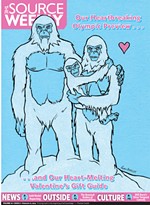Confessions of a Breast Milk Donor
My breasts have never been things of much prominence. I was never called a “balloon smuggler” in middle school. Men don’t stare at my chest. Cleavage? Hah!
In other words, I have always been fairly flat-chested. And to tell the truth, I haven’t minded—mostly. Watching large-breasted women haul their heavy load around seems like more trouble than its worth. Admittedly, I have turned a wistful eye toward my more amply endowed sisters when trying on the occasional item of fashion, but those are the only times I have wished for a more voluptuous figure.
I never thought much one way or another about my breasts until I got pregnant and began to ruminate on breastfeeding. I began to evaluate my boobs with a new eye. Those little dumplings were supposedly going to nourish a baby. Hmmm…were they up to the task?
I had read all the literature that claim size doesn’t matter, but doubts began to creep into my mind. They are awfully small, I worried to myself.
I expressed my concerns to my midwife, who dismissed them with a “don’t worry” and a knowing smile. She gave me some herbs to promote lactation, which I think she mostly did to assuage my apprehension.
I only got more anxious after my son was born. He was born with a pneumothorax, a fancy word for a hole in his lung, and was rushed to a Neonatal Intensive Care Unit in another city. We hadn’t had time to try the whole nursing thing before he was taken away.
I freaked out. I was afraid my milk was going to dry up before it ever came in. The hospital brought me an industrial breast pump that looked like something that should be steam powered and I pumped every two hours religiously
Either I needn’t have worried or my efforts paid off—I woke up three days later with two extremely painful boulders perched on my chest. It was astonishing.
It took awhile, but my baby and I started to get the hang of breastfeeding. I continued to pump, partly to relieve engorgement and partly to build up a supply for future bottle-feeding.
However, my son never took the bottle, no matter what subterfuge we tried. He looked at it as an abomination.
I had a freezer filling with little bags of breast milk and a baby who refused the bottle. It seemed a waste and sort of weird to dump all my hard work and precious bodily fluids down the drain.
I had heard of breast milk banks sometime during my pregnancy, so I did a little research and found that there are five in the country (California, Colorado, Delaware, Iowa, North Carolina, Texas). The closest one to Bend is the Mother’s Milk Bank in San Jose, California.
Breast milk banks collect milk from donors, pasteurize the milk, and then dole it out to patients with a doctor’s prescription. Donors do not get paid and patients pay only a handling fee for the milk. Often recipients are babies who are premature, have allergies, illness, or their mother can’t produce milk.
To become a donor requires a permission slip from the mother’s doctor and her baby’s pediatrician to assure the organization that being a donor does not come at the expense of the mother’s health or her child’s nutrition.
Blood tests are also in order, such as for HIV and the various varieties of hepatitis. If the woman’s insurance will not pay for the tests, the milk bank pays for them.
Being a donor also requires a 125-ounce commitment. A hundred and twenty-five ounces is just shy of a gallon. Wow. (On average, I was able to collect 3-8 ounces per session.)
When I called, I had about 45 ounces already in my freezer. I figured I could collect the rest in about a month and a half by pumping just once a day.
When I had collected about 130 ounces, I called the agency and they sent a cooler via UPS. It took about a week for them to send the cooler and by the time it had arrived I had forgotten it was coming. I looked at the cooler blankly when it arrived. “Someone sending you a kidney?” suggested the UPS driver rather unhelpfully. “I hope not,” I mumbled back in puzzlement.
Thankfully, explanatory paperwork was inside the cooler. The next afternoon, I packed up the little bags of frozen milk in the cooler, threw in a couple of frozen blue packs, and padded it with paper and foam peanuts. I slapped a large sticker on the top of the cooler that proclaimed its contents: “Contains Human Milk.” UPS picked my shipment up as their last pick-up of the day and trucked it overnight to the milk bank.
Seeing my milk disappear into the brown truck, I felt a little sad, but very happy that I was able to help other babies.
I’m still really proud of my breasts. It still seems miraculous that my little dumplings were able to exclusively nourish my son for the first six months of his life—and still produce enough to give away.
My breasts may not be huge, but they have super powers all their own. tanya@tsweekly.com




